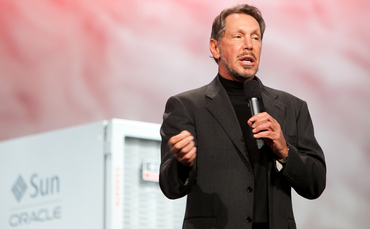Larry Ellison said today that Oracle does not plan to do any major acquisitions in the next few years but would not rule one out down the road. He made the remarks in a CNBC interview at OracleOpenWorld in San Francisco.
If Ellison really is stating the truth, it would mark a respite in one of the most prolific spending sprees the tech market has ever seen.
According to data from Wikipedia, Oracle has spent at least $45 billion on acquisitions since 2004. In contrast, IBM has spent at least $26 billion since 2001. These estimates are based upon disclosed deal valuations.
Here is a breakdown of Oracle’s biggest deals since 2004:
2004
In late December of 2004, Oracle makes its first major acquisition, purchasing PeopleSoft for $10.3 billion, capping one of the most bitter corporate takeovers in modern tech history. The battle started in 2003 with Oracle’s $13 billion bid for the company. After the PeopleSoft board turned down the takeover, the U.S Justice Department filed suit to block it themselves only to be rejected by a federal judge and the European Commission, which also refused to block the acquisition. According to Wikipedia, a month after the acquisition, Ellison cut half of PeopleSoft’s workforce, laying off 6,000 of PeopleSoft’s 11,000 employees. The battle continues today. PeopleSoft Founder David Duffield started Workday in 2006. This week the company announced its IPO. Workday is a huge rival to Oracle in the emerging market of what is blandly known as human capital management. (HCM). (With names like that, no wonder my colleagues think enterprise is so goddam dull.) Anyway, with Workday an emerging rival, Oracle has since made several acquisitions to keep up. We’ll get to the most major one in a bit.
2006
Oracle buys Siebel Systems for $5.85 billion. The CRM provider, once the largest in the world, has since fallen to Salesforce.com, a formidable rival that has come to symbolize what the cloud can offer through social technologies used in a business environment.
2007
Hyperion gets acquired by Oracle in a deal valued at $3.3 billion for its business intelligence and corporate management technology.
2008
BEA Systems joins Oracle, which pays $8.5 billion for the software company.
2010
Oracle acquire Sun Microsytems for $7.4 billion. The ramifications of the acquisition include the systematic dismantling of Sun’s open source heritage, culminating with the lawsuit against Google over its use of Java on the Android platform.
2011
In what appears more defensive than anything else, Oracle buys RightNow Technologies, a SaaS CRM provider. The deal is worth $1.45 billion but viewed in most part as a reaction to SAP’s acquisition of SuccessFactors for $3.4 billion.
2012
Oracle buys Taleo, the talent management software. The deal has the markings of battles dating back to PeopleSoft. Taleo competes with Workday.
Looking Forward
In his keynote today, Ellison reiterated the social technologies that the company purchased. He said the acquisitions were not meant solely to build out separate suites but more so for the company to develop its platform.
But it is curious why Ellison is saying no major acquisitions for the next few years. The network virtualization boom is here and should play out for the next few years. VMware acquired Nicira for $1.2 billion. Oracle acquired Xsigo Systems earlier this summer but the purchase was underwhelming at best.
So what is the next major acquisition? Here are three possibilities:
- A company in the storage space. Oracle faces IBM, EMC, NetApp and a host of new flash storage companies. Is NetApp an acquisition target?
- A data-integration company for managing different data to set up for analysis.
- One of the big data startups.
Ellison was also asked about a successor to the company he has run for the past three decades. He only said there are several who could take his place. Watch the full video here.
